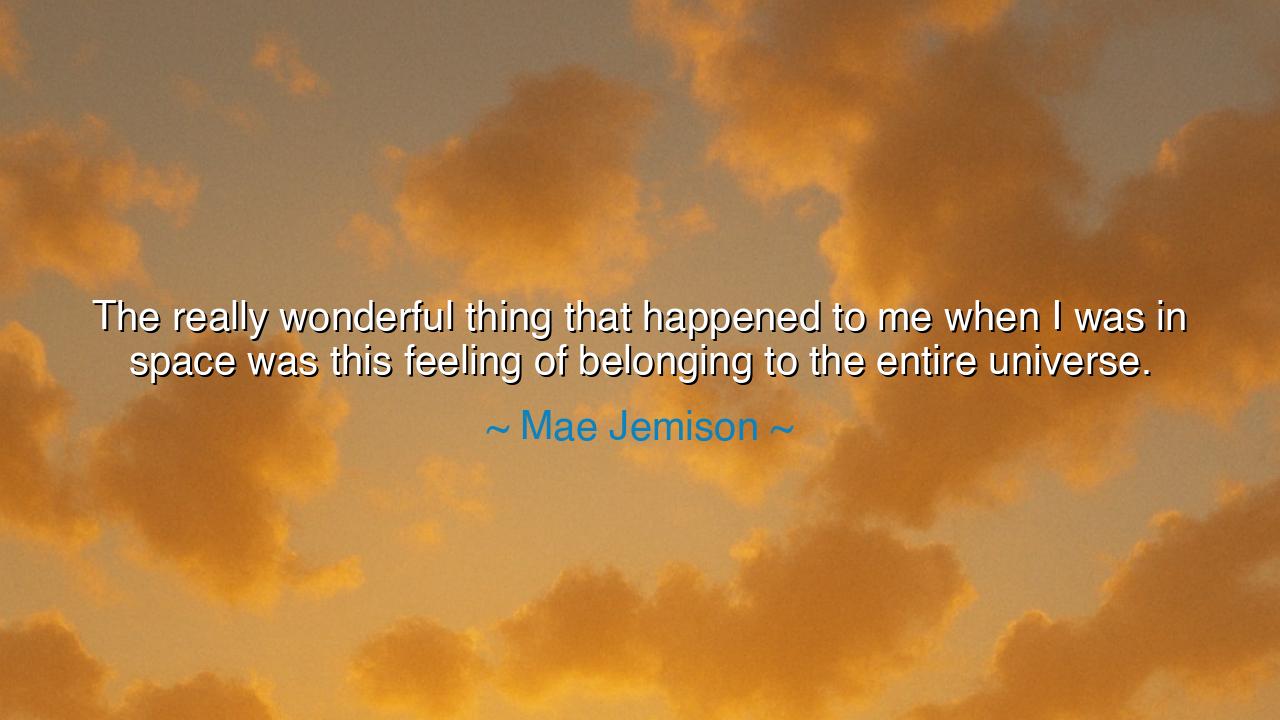
The really wonderful thing that happened to me when I was in
The really wonderful thing that happened to me when I was in space was this feeling of belonging to the entire universe.






Hear, O children of the Earth, the luminous words of Mae Jemison, who journeyed beyond the blue sky and returned with treasures of wisdom: “The really wonderful thing that happened to me when I was in space was this feeling of belonging to the entire universe.” This is no idle reflection, but the utterance of one who has seen with her own eyes what the sages of old only dreamed: that the human soul is not bound by borders of soil or nation, but is kin to the stars themselves.
To say “I belong to the universe” is to awaken to the truth that man is not a stranger in the cosmos. We are not orphans cast adrift upon a cold planet, but children woven of the same dust that burns in suns and spins in galaxies. Jemison’s revelation echoes the voices of the ancients, who proclaimed, “As above, so below.” The atoms in our flesh are born of long-dead stars; the rhythm of our breath follows the tides pulled by the moon; the spark of our minds mirrors the fire of the heavens. To feel this in the stillness of space is to stand in awe of one’s true home.
Consider the tale of the Apollo 8 astronauts, who in 1968 became the first humans to circle the moon. In the vast silence, they looked back and beheld Earth—small, fragile, a blue jewel set in infinite darkness. It was then they read aloud the words of Genesis, not to claim the cosmos for one people, but to remind all humanity of its shared origin and destiny. The image they brought back, “Earthrise,” stirred millions with the same truth Jemison felt: that we do not merely live on the Earth, we live with the universe, as part of a greater body.
The ancient Stoics taught that the wise man is not a citizen of Athens or Rome alone, but of the cosmos. They named this belonging cosmopolitanism—to be a citizen of the world and beyond. What Jemison experienced in orbit is the living flame of this ancient teaching. She was not only American, not only astronaut, not only scientist—she was human, woven into the fabric of all that exists, kin to the galaxies that spun before her eyes.
Yet her words also call us to humility. For if we truly belong to the universe, then so does every other being—every man, woman, child, every tree, river, and creature. To harm another is to harm ourselves, for all are bound in the same cosmic web. Nations that war forget this truth, communities that divide lose this vision, individuals who live only for themselves forsake their greater home. Belonging is not possession; it is responsibility.
What lesson then should we take into our own lives? It is this: awaken to the vastness of your identity. Do not shrink into the narrow shell of “mine” and “thine,” or of “us” and “them.” Remember, as Jemison did, that you are kin to the stars. Live not only for yourself but for the good of all creation. Practical actions follow: practice stewardship of the Earth, for it is your cosmic dwelling; honor others, for they are your fellow citizens of the universe; and seek always to expand your perspective, for small vision breeds small living.
Thus let Jemison’s words be carried down as a song for generations: “The really wonderful thing that happened to me when I was in space was this feeling of belonging to the entire universe.” Let it remind you that you are not adrift, not alone, but embraced by the vastness. Let it stir you to live as a true child of the cosmos—humble, compassionate, and bold. For in belonging to the universe, you also belong to eternity.






AAdministratorAdministrator
Welcome, honored guests. Please leave a comment, we will respond soon